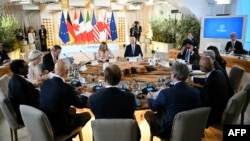In their joint communiqué at the end of the G7 meeting in Italy, the leaders of Britain, Canada, France, Germany, Italy, Japan, and the United States articulated a united policy on several key issues.
Among them were the continuing need for support for Ukraine against Russia’s aggression; the security threat posed by China’s industrial overcapacity, as well as the PRC’s provision of items to Russia that bolster the Russian war machine; the brutality of Hamas’ October 7 terrorist attack on Israel and support for the comprehensive deal outlined by President Joe Biden that would lead to an enduring end to the crisis; a commitment to step up assistance to African countries to aid in sustainability and democratic governance.
Iran’s destabilizing actions were another focus of the G7 leaders. They urged Iran “to cease and reverse nuclear escalations and stop the continuing uranium enrichment activities that have no credible civilian justifications.” The G7 called on Iran to engage in serious dialogue with the International Atomic Energy Agency and “provide convincing assurances that [Iran’s] nuclear program is exclusively peaceful.” They expressed “strong concern” about Iran’s current lack of cooperation with the Agency.
The G7 leaders also urged Iran to stop assisting Russia’s war in Ukraine and “not to transfer ballistic missiles and related technology” because doing so would represent “a substantive material escalation and a direct threat to European security.” The leaders warned there would be “new and significant measures” taken against Iran, if Iran proceeded to transfer such weapons.
Additionally, the G7 warned that if Iran did not “cease its malicious activities and destabilizing actions in the Middle East,” the G7 “stood ready to adopt further sanctions or take other measures in response.”
Finally, the G7 leaders reiterated their “deep concern over Iran’s human rights violations, especially against women, girls and minority groups.” They called on Iran’s leadership “to end all unjust and arbitrary detentions, including of dual and foreign citizens,” and they condemned the “unacceptable harassment” of Iran’s own citizens as well.
State Department Spokesperson Matthew Miller hailed the strong stance taken by the G7 leaders on Iran. “We welcome the G7 speaking with one united voice about the threat that Iran poses and the threat that its destabilizing activities pose,” he declared. “We have seen a growing agreement on that question internationally, not just with our G7 partners but with other countries around the world.”






